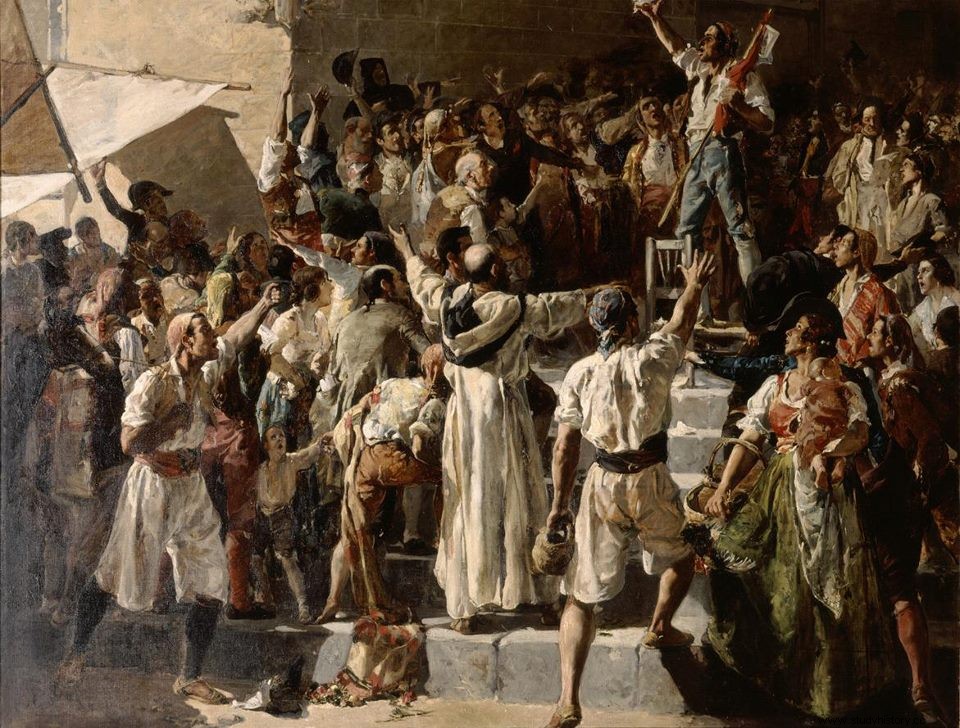In 1807, France and Spain signed the Treaty of Fontainebleau, which agreed to divide Portugal (an ally of England) between the two powers. Controlled the sea by the English and the Portuguese, the only viable option was for the French troops to cross the Peninsula, so numerous French military contingents entered Spain. General Murat, Napoleon's lieutenant for all his armies in Spain, arrived in Burgos on March 13, 1808 and set out for Madrid. Napoleon was aware of the political crisis of the Bourbon regime and was going to take advantage of the situation.
In the court of King Carlos IV, whose government was exercised in practice by the worthy Manuel Godoy, there was a group of conspirators led by the most reactionary sectors and by those dissatisfied with Godoy's actions. In the shadows, pulling the strings, was Fernando, the heir to the throne. The conspiracy of the court, a weak king, Godoy fallen into disgrace and the popular protest that broke out in the so-called Aranjuez mutiny (March 17, 1808), forced the king to cede the throne to his son Fernando VII . Nothing changed in Spain, the king was a puppet in the hands of Murat and his military troops. Ferdinand VII was called to Bayonne to meet with Napoleon. The king, wishing that the emperor would recognize him, left for Bayonne, leaving the Supreme Board of Government control of the nation. On April 30, Napoleon met Carlos IV, Godoy and Fernando VII in Bayonne. Napoleon controlled Spain (or so he thought).

Around eight in the morning of May 2, two carriages were stopped at the gates of the Royal Palace of Madrid. Being market day, there were many people in the surroundings. In the first carriage people saw the Infanta María Luisa get on, and the crowd thought that the second was for the Infante Francisco de Paula. At that moment, the teacher José Blas Molina shouted:
Treason! What are they taking us!
They released the horses and entered the Palace. The revolt had broken out. Murat sent companies of Imperial Guard grenadiers accompanied by 2 artillery pieces that littered the ground with corpses. The clash triggered a popular backlash that spread throughout the city. The desire of the people to prevent the infant from being taken to France was joined by that of avenging the dead and getting rid of the invaders. Isolated Frenchmen were killed and hundreds of people from Madrid gathered at Puerta del Sol. Mamelukes, cuirassiers and dragoons arrived there and massacred the crowd. Madrid was being the sad protagonist of a pitched battle between two unequal armies:one formed by the French elite troops and the other by the common people of Madrid armed with knives, scissors, pots and even hot oil that they poured on the horsemen.

In the midst of that sindio, a "prison official of the time" delivers to the warden of the Real de Madrid prison a letter written by the inmate Francisco Xavier Cayón . This letter, written on behalf of all of them, read like this...
Having noticed the disorder that is evident in the town and that weapons and ammunition are thrown from the balconies for the defense of the Homeland and the King, he begs, under oath to return to prison with his companions, that they be released to go to risk his life against foreigners.
Although at first the warden thought to ignore the letter and tear it up, because he did not trust the word of the inmates, he had no choice but to agree to the request in the face of the riot that was already brewing inside the prison. So, they were given permission to go out, kill a few frogs, and return to the night count. Of the ninety-four inmates housed in the prison, fifty-six took to the streets armed with their prison spikes, baseball bats, and brass knuckles. To the cry of Long live the king!” and Death to the frogs! gave a good account of all the members of the Grande Armée that they found in their path. And like Cinderella, before her carriage turned into a pumpkin, they kept their word and returned to the jail for the night's count and to rest in their cells. Of course, surely more than one took advantage of the occasion to clean the pockets of the fallen French and take a souvenir, such as a wallet, watch, mobile...
Is everyone back?
Of the 56 who left, 4 died in the clashes and 51 were present for the nightly count. So, we're missing one… he came back the next day. It seems that he decided to pay the relative a visit and, between get well and be quiet, he lost track of time.
